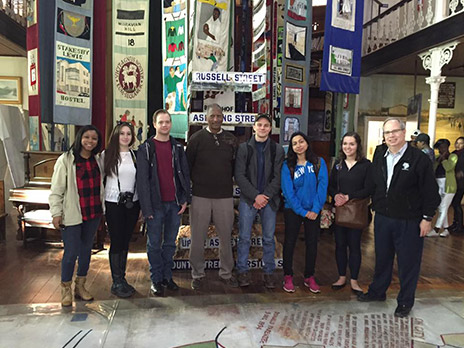Published on Nov. 15, 2016

Studying abroad is an eye-opening experience for most students. For Rachel Foster-Gimbel, not only was her first study abroad trip eye-opening, it also led to a second trip.
Foster-Gimbel, a senior journalism major with an emphasis in convergence journalism, believes the point of study abroad is to be uncomfortable and to go to a place that forces you to learn and grow.
Her first study abroad trip in the summer of 2015 was through the Council on International Educational Exchange. The trip to Ghana, Africa, exposed her to another culture and allowed her to travel within the continent and learn about its history. Her experience was so great, she wanted to do it again. She spent last summer in Cape Town, South Africa, on a study abroad trip offered through the MU School of Journalism.
“That South Africa trip is one of the undiscovered, great opportunities of this school,” Foster-Gimbel says.
The goal of the trip, which is led by MU professor Randy Smith, is to tell the stories of Africa as they relate to apartheid Nelson Mandela and other aspects of that time. Students go through printed archives to find stories, then digitalize them.
Students on the trip included print and digital media students. They worked together to write, film and craft pieces that told stories about Africa’s history. Among other projects, all of the students on the trip worked together to interview and write about Albie Sachs, who helped write the new democratic constitution for South Africa.
Foster-Gimbel’s immersive experience in South Africa taught her a lot about the country, its history and its culture and gave her a much broader perspective of the continent.
“For a lot of people, when they think of Africa, they think of a third-world country,” she says.
However, Foster-Gimbel points out that many parts of the continent look similar to what is seen in Europe or the U.S., and contrary to popular belief, South Africa and other parts of the continent have great infrastructure and beautiful homes.
Africa, Foster-Gimbel says, is mysterious. “People don’t understand it that well, so that’s why I like to go back and keep learning about it,” she says.
Professor Monika Fischer, who has organized prior study abroad trips to Ghana, says that while all study abroad experiences are beneficial and recommended, visiting the developing world offers even more opportunities for learning.
“It opens one’s eyes that most of the world does not have the material comforts we have,” Fischer says. “After all, only about 15 percent of the world’s population lives in the developed world.”
Smith agrees. “There’s nothing wrong with studying in Europe,” he says. However, Smith believes there are more values in Africa, Asia and Latin America, in which many countries have recently won their freedom and are building new societies.
“There is a likelihood a student will be wiser after his or her return—more empathetic, a better listener and observer, perhaps more appreciation of what has long been taken for granted—clean air, good food, the internet, safe water,” Smith says.
For Foster-Gimbel, one of the most important aspects of studying abroad is taking her experiences and what she’s learned and doing something with them. Study abroad can be a life-changing experience, she says, but students must actively work to make it one through the classes they take, the news they read, the organizations they are involved in.
“There are opportunities you have, she says. “When you come back, you can do these things. You can make it life-changing.”